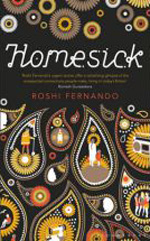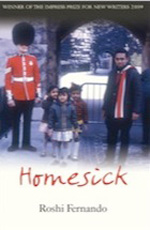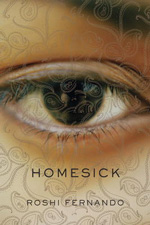
In Homesick, author Roshi Fernando interweaves seventeen short stories to form what the publisher calls "a composite novel." In these stories, Fernando introduces us to an extended cast of characters living in the Sri Lankan immigrant community of South London. In just 200 pages, she covers a time period of almost fifty years—starting in the early 1960s and moving forward to our current era. On top of the expected themes surrounding the immigrant experience, Fernando ambitiously tackles unhappy marriages, sexual abuse, alcoholism, identity crises, teen heartbreak, racism, loneliness, organized crime, terrorism, civil war, gay sex and lesbian love, and even Elvis Presley. If this sounds potentially too dire to bear, be assured that Fernando carries it off with sensitivity and grace, and often a dash of humour.
The book opens at a party on New Year's Eve, 1982, with the story "Homesick," and it is here that Fernando introduces all of the major characters. In fact, in the first nine pages of the book, we are presented with a whopping thirty-one names. Some of these people become very important later on, some are peripheral characters who appear occasionally in the wings, and some are never mentioned again. But there is no way of knowing any of this while reading these early pages, and keeping the names straight in your head is a real struggle. The book would have benefited greatly from a character chart in the preface.
After the opening story, the book jumps back in time about twenty years, and from there it hopscotches in rough chronological order through the characters' lives. Fernando's narrative technique is a literary equivalent of a time traveler who carries a camera equipped with a powerful telephoto lens, and focuses sharply on an event in an individual life before swooping out and flying on to the next one. She anchors this approach by returning every few stories to check in on what is happening with Preethi. We meet her as she starts nursery school, and accompany her through teenage parties and boyfriends, and then her later adult struggles. In between the updates on Preethi, some of my favourite stories are the complex "The Fluorescent Jacket"; "Nil's Wedding," which captures a bride's trepidation on her wedding day; and "Research," where an archivist puts together her life from pieces of her painful past.
"A short story is a whole life," Roshi Fernando says. "I treated each one with as much respect and anxiety as I would the writing of a novel." There is definitely a merging of the novel and short story forms here. Although the stories tie together, some of those ties are rather loose, and one story doesn't necessarily relate to the story that it follows. This has the effect of reading a series of mini-novels. Because the author gives little information on who characters are, or how they relate to other characters, and further, never exactly states the date or year, the reader must puzzle out this important information from cultural references and clues that she drops. This is not a book for someone who likes a straightforward plot and things spelled out plainly, and Fernando never tells you what to think. However, for the reader who doesn't mind doing a little work, Homesick is a richly rewarding reading experience. Although it's not always immediately clear how one story connects to the others, Fernando helps the reader by using a clear, even sparse, writing style. There are no long flowery passages here. This approach has worked in her favour, as she has been nominated for many awards, and won the Impress Prize for New Writers in 2009. Roshi Fernando is an upcoming talent in the literary scene, and a writer who deserves to be widely read.

Bloomsbury (UK), hardcover, 9781408826409

Impress Books, paperback, 9781907605024

Knopf (US), hardcover, 9780307958105 (July)
